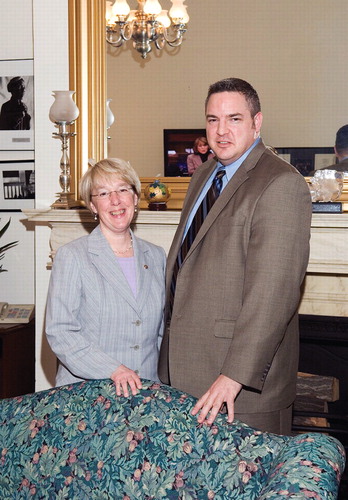Congress Benefits From Psychiatrist in Its Midst
Psychiatrist Daniel Bober, D.O., has had an experience of which only a handful of his colleagues can boast. Invited to join the staff of U.S. Sen. Patty Murray (D-Wash.), Bober has been able to contribute directly to the development and advancement of mental health legislation as a Capitol Hill insider.

Bober completed a 10-month stint as APA's 2008 Jeanne Spurlock Congressional Fellow earlier this year. The fellowship, now in its sixth year, provides an opportunity for residents and early career psychiatrists in the areas of child and/or minority mental health to learn about the legislative and public-policy processes from the inside, with the goal of preparing them to be mental health advocates in the future. Bober completed a residency in child and adolescent psychiatry at the Yale Child Study Center and a forensic psychiatry fellowship at the University of Massachusetts.
Murray serves on several committees that have jurisdiction over health issues, including the ones that are responsible for the mental health parity bill and veterans' health concerns. Bober praised Murray as “a true champion of veterans and people with mental illness and, by virtue of her committee assignments, is able to put her interests in mental health to direct use.” He added that her positions on mental health issues made it easy for him to contribute his clinical training, experience, and knowledge.
A particularly rewarding part of his Senate experience, he said, was meeting veterans of the Iraq and Afghanistan wars, as well as their families, at Walter Reed Army Medical Center, where many of the most seriously injured combat veterans are sent. Bober noted that he was able to help Murray and her staff interpret numerous studies of veterans' mental health and discuss sequelae of serving in a war zone. In addition, he said, after meeting with veterans' service organizations and veterans' families, he was better able to“ more clearly define the legislative priorities that we should focus on when trying to help veterans and their families.”
Bober also had the opportunity to brief Murray prior to the confirmation hearing for James Peake, M.D., to be secretary of Veterans Affairs. After his confirmation, Peake was the keynote speaker at APA's Advocacy Day program.
The reauthorization bill for the Substance Abuse and Mental Health Services Administration (SAMHSA) was another area on which Bober worked. “I participated in weekly working groups with the HELP [Health, Education, Labor, and Pensions] Committee staff to update and modify existing SAMHSA legislation to more clearly reflect the new challenges that we face in mental health and substance abuse treatment,” he said.
The fellowship “was an experience I will never forget,” he stated, “and it has emboldened me to continue to serve those who may not have a voice and need someone to fight for them.”
Information about the Jeanne Spurlock fellowship and APA's other minority fellowships is posted at<www.psych.org/Resources/OMNA/MFP.aspx>.▪



